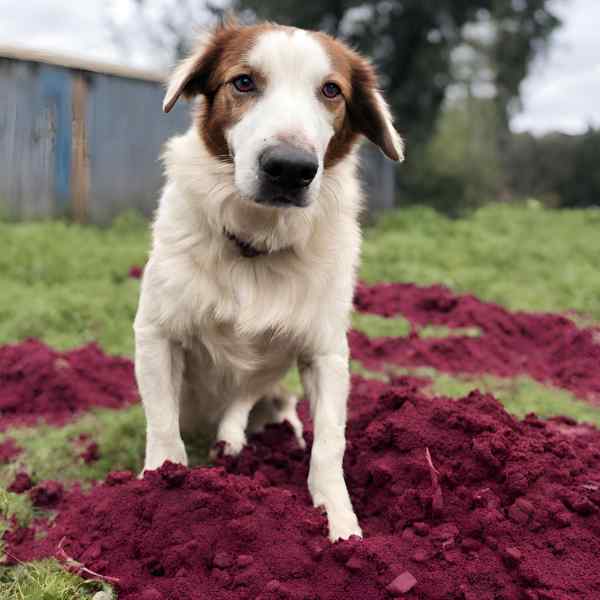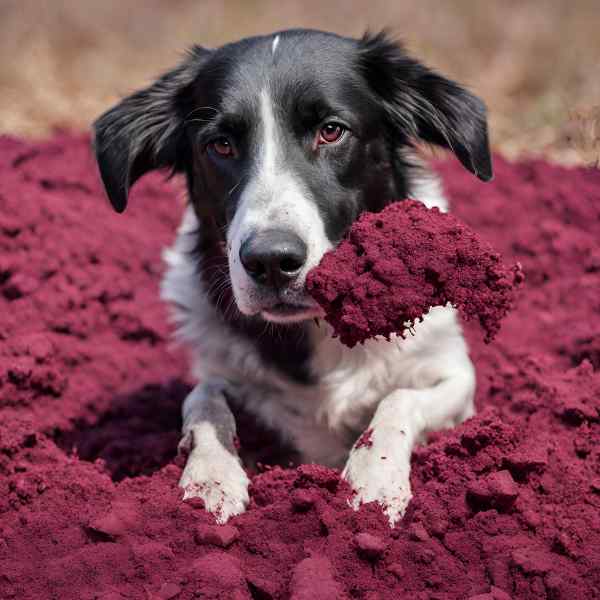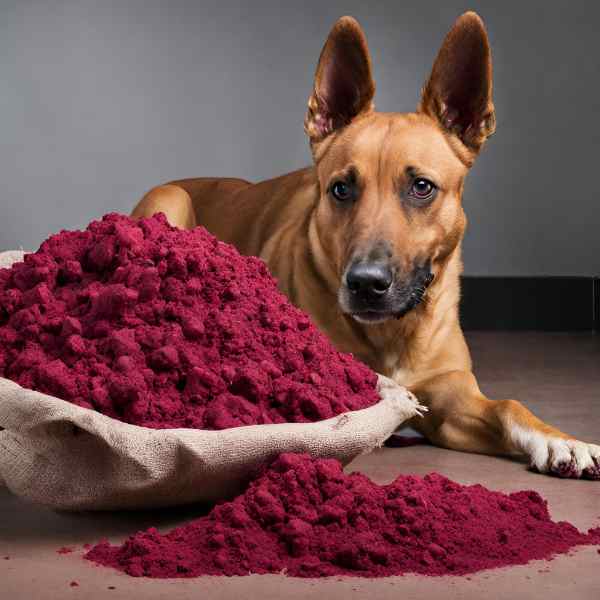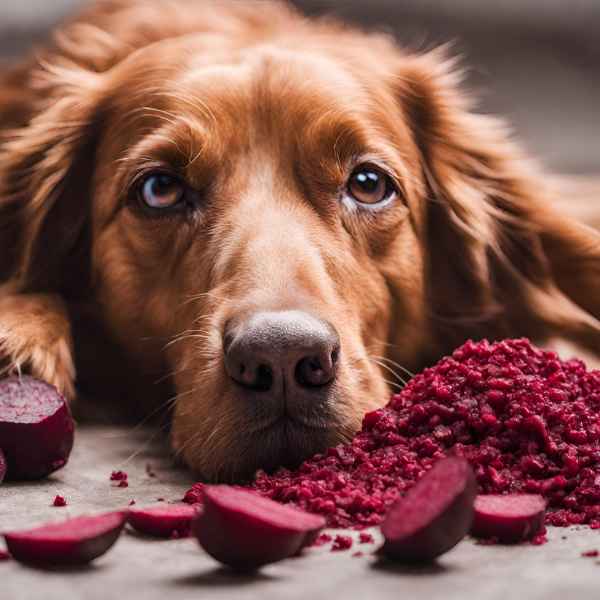Many dog owners wonder, “Can dogs eat beet pulp?” The short answer is yes; however, moderation is required. Beet pulp is a good source of fiber, helps in digestion, and promotes overall gut health in dogs.
In this detailed article, we will explore the nutritional benefits and health risks associated with feeding beet pulp to your dogs.
Understanding Beet Pulp
Beet pulp is the fibrous treat remaining after extracting sugar from sugar beets. This pulp is then dried and often used as an ingredient in pet foods, including dog foods.

It serves as a high-quality fiber source, rich in soluble fiber. Beet pulp, often used in pet foods, including dog foods, aids in digestion and promotes gastrointestinal health.
Nutritional Composition of Beet Pulp
| Nutrient | Dried Beet Pulp (%) | Pressed Beet Pulp (%) |
|---|---|---|
| Dry Matter | 88.9 | N/A |
| Crude Protein | 7.9 | N/A |
| Crude Fiber | 17.2 | N/A |
| Crude Fat | 0.8 | N/A |
| Calcium | N/A | 3.5 |
| Phosphorus | N/A | 0.2 |
| Viscous Polysaccharides | 16 | N/A |
| Dietary Fiber (approx.) | 70 | N/A |
| Protein (approx.) | 10 | N/A |
| Fat (approx.) | 7 | N/A |
| Sugar (approx.) | 8 | N/A |
| Ash (approx.) | 4 | N/A |
Can Dogs Eat Beet Pulp?
Yes, beet pulp is safe for dogs. Beet pulp is a valuable source of fiber that can help in digestion and promote overall gut health in our dogs.
This makes it a suitable choice diet for dogs’ health. However, you should avoid using any type of ingredients and seasonings that are not recommended for the dog’s health.
Additionally, beet pulp may provide some nutritional benefits, including vitamins and minerals like potassium and manganese. However, it’s essential to feed beet pulp to dogs in moderation, as excessive consumption can lead to gastrointestinal upset.
Health Benefits of Beet Pulp for Dogs
Consider the following benefits:
Digestive Health:
Beet pulp contains both soluble and insoluble fiber that play an important role in maintaining your dog’s digestive health. Soluble fiber helps in water absorption and prevents constipation.
On the other hand, it also helps in promoting regular bowel movements and preventing diarrhea. The combination of soluble and insoluble fiber in beet pulp helps to maintain the overall function of the digestive system.

Nutrient Absorption:
Your dog becomes able to absorb the important nutrients in different types of food with the help of fiber. The soluble fiber turns into a gel in their intestines and makes the absorption of all the vitamins and minerals slowly and effectively.
Firm Stools:
Beet pulp has a positive impact on dogs‘ intestinal health and contributes to the production of firmer stools. The firmer stools result from the balanced combination of soluble and insoluble fiber, regulating the water content in the feces.
Probiotic Support:
Beet pulp is not a probiotic but it is a source of good bacteria that can help in digestion. This treat helps in the food digestion process and the intake of nutrients from that food.
Safe and Nutritious:
Beet pulp is a good and safe food for dogs. It has important vitamins and minerals like iron, potassium, and magnesium and these make your dog healthy without causing any harm.
Risks and Considerations
Here are key considerations for dog owners:

Fiber Content: As beet pulp is a fibrous treat, if your dog consumes excessive amounts of fiber it can lead to several digestive issues.
Variability in Effects: Beet pulp’s effects differently directly depend upon the size and age of the dogs. Several factors like size, breed, and overall health should be considered when incorporating it into their diet.
Quality of the Ingredient: The source and quality of ingredients in beet pulp matter a lot on dogs’ health. You must select dog foods from trusted brands that prioritize high-quality ingredients to mitigate potential concerns.
Preparation and Serving Suggestions
Here are some key points to ensure your dog enjoys the benefits of beet pulp in a safe and palatable manner:

Hydration is Key: Keep beet pulp in water for some time before feeding it to your dog. This not only softens the pulp but also ensures your dog gets an extra hydration boost.
Moderation Matters: While beet pulp is a fantastic source of fiber, moderation is key. Introduce it gradually into your dog’s diet to prevent any digestive discomfort.
Check for Allergies: Before incorporating beet pulp, check for any allergic reactions. Start with a small amount and observe your dog’s response.
Choose Quality Sources: Choose high-quality beet pulp to ensure it’s free from additives or harmful substances.
Consult Your Vet: Always consult your veterinarian before making significant changes to your dog’s diet. They can provide personalized guidance based on your dog’s specific needs.
FAQS
Is beet pulp safe for all dog breeds?
While generally safe, some breeds may have specific sensitivities. You can talk to the vet and they can guide you on what and how to feed.
Can beet pulp cause allergies in dogs?
While rare, some dogs may be allergic to components in beet pulp. You can monitor their reaction after they eat something.
How much beet pulp should I feed my dog?
The portion depends on your dog’s size, age, and activity level. Consult your vet for tailored recommendations.
Are there any alternatives to beet pulp for fiber in a dog’s diet?
Yes, alternatives include sweet potatoes, pumpkin, and brown rice, among others.
Can I feed my dog raw beet pulp?
It’s recommended to cook beet pulp before serving to dogs, using methods like boiling or steaming. Raw beet pulp may be challenging to digest.
Conclusion
In conclusion, beet pulp can be a safe and healthy dog food but moderation is required. Beet pulp contains a good amount of important vitamins and minerals and can be beneficial if your dogs eat it as a treat occasionally.
Beet pulp for dogs is healthy as long as you keep the guidelines in mind about how you feed them. You can feed either normal or dried beet pulp by following the steps mentioned above.
Happy Snacking!
